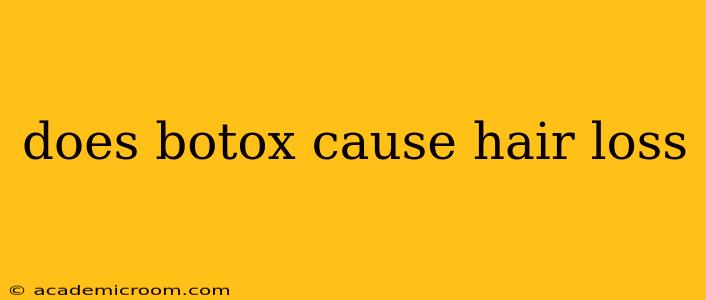The question of whether Botox causes hair loss is a common one, fueled by anecdotal evidence and online speculation. While Botox is primarily known for its cosmetic uses in reducing wrinkles, its potential impact on hair growth remains a topic of interest and some concern. Let's delve into the facts to separate the truth from the myths.
What is Botox?
Before examining the link (or lack thereof) between Botox and hair loss, it's crucial to understand what Botox actually is. Botox, short for botulinum toxin type A, is a neurotoxic protein produced by the bacterium Clostridium botulinum. When injected, it temporarily blocks nerve signals to the muscles, causing them to relax. This relaxation is what reduces the appearance of wrinkles. The injections are typically targeted to specific facial muscles.
Does Botox Directly Cause Hair Loss?
The short answer is: no, there's no direct causal link between Botox injections and hair loss. Botox injections are localized to the muscles; they don't affect the hair follicles directly. The mechanism of action of Botox does not involve processes that would interfere with hair growth cycles. Hair loss is a complex process influenced by genetics, hormonal changes, stress, and various medical conditions. Botox simply doesn't play a role in these processes.
Why the Concern?
The confusion likely stems from several factors:
- Stress and Anxiety: Undergoing any cosmetic procedure, including Botox injections, can cause stress and anxiety in some individuals. Stress is a known contributor to hair loss (telogen effluvium), so the timing of hair loss following a Botox treatment might be coincidental. The hair loss is not a direct result of the Botox itself, but rather a response to the stress.
- Underlying Medical Conditions: Some individuals may experience hair loss due to unrelated underlying medical conditions. The onset of hair loss around the time of a Botox treatment could be purely coincidental, with the Botox being unrelated to the hair loss.
- Misinformation: Misinformation and anecdotal accounts spread online can contribute to the misconception that Botox causes hair loss. It's crucial to rely on credible sources and scientific evidence.
Could Certain Factors Indirectly Contribute to Hair Loss?
While Botox injections themselves do not directly cause hair loss, some indirect factors could potentially play a role:
- Improper Injection Techniques: In rare cases, improper injection techniques could, in theory, lead to localized damage near the hair follicles if the injection is not administered correctly. This is extremely rare with qualified, experienced professionals.
- Allergic Reactions: Although rare, allergic reactions to Botox are possible. A severe allergic reaction could potentially lead to inflammation that, in theory, could affect hair follicles in the surrounding area, though this is not a typical consequence.
What Causes Hair Loss? (People Also Ask)
This section will address common questions related to hair loss, addressing potential concerns further:
What are the common causes of hair loss?
Hair loss can stem from various factors, including genetics (androgenetic alopecia), hormonal imbalances, medical conditions (like thyroid disorders or autoimmune diseases), nutritional deficiencies, stress, certain medications, and aggressive styling techniques.
Can stress cause hair loss?
Yes, significant stress can trigger a type of hair loss called telogen effluvium. This is a temporary condition where stress causes a larger-than-usual number of hair follicles to enter the resting phase, leading to increased shedding several weeks or months later.
What are the different types of hair loss?
There are several types of hair loss, including androgenetic alopecia (male and female pattern baldness), alopecia areata (autoimmune hair loss), telogen effluvium (stress-related hair loss), and anagen effluvium (drug-induced hair loss).
How can I treat hair loss?
Treatment options for hair loss depend on the underlying cause. These might include medications (like minoxidil or finasteride), hair transplantation, changes in lifestyle (like improved diet and stress management), or addressing underlying medical conditions.
Conclusion
In conclusion, there is no scientific evidence to suggest that Botox directly causes hair loss. Any association between Botox treatments and hair loss is likely coincidental due to factors like stress, underlying medical conditions, or misinformation. Always consult a qualified dermatologist or medical professional for any concerns about hair loss or before undergoing any cosmetic procedures. They can accurately diagnose the cause of your hair loss and recommend the most appropriate treatment.
